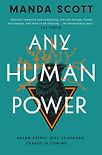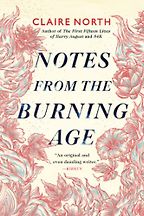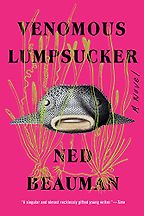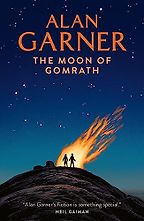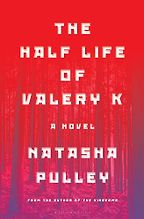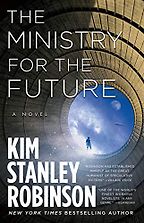Thank you for putting together this list of recommended ‘eco thrillers,’ which I’ve been thinking of as books with elements of suspense, but also environmental or climatological storytelling. Does that sound right to you?
Yes, I think you are right about the suspense. When I published my very first novel, Hen’s Teeth, I had a bizarre—to me—conversation with my editor at the time, who told me that they couldn’t publish the book because they ‘only published mysteries,’ and so I had to work out what a thriller was, and how it might be different from a mystery.
It seemed to me that a thriller is a narrative where the main protagonist is in definable, regular and intermittent danger. It can’t be full-on threat all the time—we have to ramp up the danger and then offer lapses… but it has to be tangible. And of course they don’t always survive: the unknowing is what creates the narrative tension.
So, this list combines this concept of a thriller, with an awareness of the greater climate and ecological emergency – what we might more broadly call the poly-crisis, or the great derangement, or the great transformation—and this has to be integral to the plot, not tacked on as a veil of greenwashing over a standard narrative of business as usual. We are beyond this: we urgently need total systemic change, so I’m looking for books that at least step in this direction.
We’ve seen a rise in so-called ‘cli-fi’—what The New York Times has called “a tsunami of recent climate change literature.” What do you think the role is of fiction, or art more generally, in responding to the climate emergency?
I think it’s essential. It’s what we have to do. Back in 2014, Ursula le Guin said: “We live in capitalism. Its power seems inescapable. So did the divine right of kings. Any human power can be resisted and changed by human beings. Resistance and change often begin in art. Very often in our art, the art of words.”
And she’s right. Every part of my life now is focused on how we weave the ghost lines of possibility across the terrains of tomorrow, so that people can see that there is an alternative. Clearly we are locked into capitalism, and we are often told explicitly that there is no alternative, but what we as writers can recognise, and what we can get across is that this is fundamentally untrue. What I’d rather we didn’t do—but a lot of my peers still do—is write the dystopias: the futures that arise when we let the worst of humanity run riot. I get so cross with this because it’s lazy and it’s not useful. We don’t need extra help in imagining how bad it’s going to be, and it doesn’t change anyone’s behaviour: if it did, we wouldn’t be in the current mess. I’ve just written the start of a series that endeavours to imagine something different, and how we get there from here.
Then there’s a second wave of cli-fi, particularly ‘solarpunk,’ which is deus ex machina—there’s a gap, something has happened, and we’ve got some way of making everyone a decent human being, and here’s the future we could build if we got everything right. I don’t see that as much more useful than the dystopias, because, yes, that’s nice, but it’s not real. We can’t see how to get from here to there in ways that feel grounded in any kind of recognisable reality.
“Every part of my life now is focused on how we weave the ghost lines of possibility across the terrains of tomorrow”
Even these, though, are the minority. Most people are still writing novels that assume business as usual will sail on regardless and people’s lives will be untouched by the grim concatenation of biophysical collapse, rampant pollution, democratic breakdown, technological chaos, an economy that has to grow regardless of its impact on people and planet and the soaring inequities of the predatory capital death cult.
Which is astonishing, frankly, and speaks to a real imagination deficit. So I would beg all my fellow writers to please stop writing books predicated on the assumption that everything is going to be fine, because that’s quite evidently not true. I do know it’s hard to work out how we can move forward. But it’s not impossible. It requires letting go of ‘business as usual.’
Amitav Ghosh said that future generations looking back will hold the politicians and bureaucrats culpable for the disaster of what he called The Great Derangement. And rightly so. But they should hold writers and artists culpable too, because it’s our job to imagine a different future. It’s what we’re here for. And too few of us are doing it.
Shall we start with your first eco-thriller book recommendation? This is Notes from the Burning Age by Claire North.
This is such a good book. It took me some time to get into it, because it’s a future novel, looking back at the ‘Burning Age,’ which is now. The premise of the book is that a group of entities called the kakuys, spirits of the Earth, arose during the Burning Age to stop the burning from happening.
It starts with three children who go into the forest: one dies and we follow the lives of the other two. They live in a eco-communitarian community where the kakuys are viewed as god-like and the priests in the Temple help everyone stay in balance: it’s a beautiful utopia.
Which was one reason why I found it hard to get into. I loved Claire North’s previous book The First Fifteen Lives of Harry August. If your readers haven’t read it, I totally recommend it – but it’s definitely not utopic.
I pushed through, though, and Notes moves forward in time, to the adulthood of one of the two surviving children. He is revealed to be an undercover agent who has gone very deep cover inside ‘the Brotherhood,’ which has set up in opposition to the Temple: very much like the climate deniers now have set up in opposition to anyone attempting to create a livable future.
So at one level it is a spy thriller—a brilliant one—in which our hero is endeavouring to discover the identity of his opposite number: a member of ‘the Brotherhood’ who is deep undercover in ‘the Temple.’ The detail of his life is fascinating—what the Temple does is mine for notes from the Burning Age; they go through the debris of the past, and bring out cat videos, pornography, the texts from someone about what their boyfriend said—all the digital rubbish we’re throwing out. But in amongst it are designs for things that might be useful: internal combustion engines and tanks and submarines.
It’s so cleverly done. It leans on that Arthur C. Clarke concept that any sufficiently advanced technology is indistinguishable from magic. It’s beautifully written and works on every level: as thriller, as a spy novel, as a love story of sorts, as a warning of how bad things could be but with a sense that the world will fight back—and ultimately as a wry look at the rubbish we’re creating online. It completely and excruciatingly shines a light on how we have behaved, what we have done, and what we have become as a result.
Overall, as with all North’s work, it’s a beautifully written, incredibly clever book, with gorgeous language. The depth of the characterisation is beautifully done so that, from a writer’s perspective, it’s a masterclass. And from a reader’s perspective it kept me up too late for many nights in a row. That’s always a good recommendation for a book.
Your second eco-thriller recommendation is Ned Beauman’s Venomous Lumpsucker, which won the Clarke Award in 2023. What do you admire about it?
The writing. I really admire the writing. This is a very different feel of book to North’s Notes. Again, it’s a near-future book. It’s set in a Europe where everything is still readily identifiable. And he says in the author’s note that he has kept the value of the Euro almost as it is in 2022, but with inflation so that we can do the arithmetic in our head—which matters because some of the details depend on there being quite large amounts of money at stake. But science has moved on a little, as has politics. This is predatory capitalism at its most predatory.
We have two main characters, Karin and Mark. Karin is a scientist on board a research vessel. The eponymous venomous lumpsucker is a tiny fish that is allegedly supremely intelligent; Karin’s job is to find and investigate intelligent species, because the penalty for causing extinction in something intelligent is financially relevant, whereas the penalty for wiping out something unintelligent probably isn’t. So market forces apply to the deliberate extinction of species: it’s horribly cynical.
We start off with Karin on the boat trying to find the venomous lumpsucker, then she finds herself locked into her cabin and her internet connection is down. Suddenly she’s in isolation and she doesn’t know why.
“Ursula le Guin said: ‘We live in capitalism. Its power seems inescapable. So did the divine right of kings’”
Mark is one of the least likeable main characters I’ve ever met. I was going to call him ‘morally ambiguous,’ but that would suggest he had good points when in fact he’s just utterly self-serving. The first thing we see is him dodging an enormous tumour being hurled at him be eco-terrorists, who grow these massive tumours and throw them around. Trust me, it completely makes sense within the confines of the book; or at least, it does by the end. Gradually we discover Mark works for a kind of bio-engineering company. He made a bet with the company’s money on what was essentially a DNA bank of all the things likely to become extinct, so the company wouldn’t get fined for destroying their last habitat in a deep-sea mining operation. It was going okay until somebody destroyed the bank in an act of terrorism—and now he needs the venomous lumpsucker not to be extinct or he’ll go to prison. Karin is decent but yet she’s being employed by the mining company that wants to destroy the lumpsucker’s last habitat, to prove that it’s not the last habitat so they can go ahead and destroy it.
So these two end up working together to try to find the last surviving venomous lumpsuckers with the clock ticking and Mark likely to go to prison – and though he’s such a callow individual, it’s hard not to like him—and Karin is facing her own inner demons that gradually unfold.
This is the clever thing. Apart from the genuine humour in the writing—deeply black, but still laugh-out-loud funny—the narrative feels like a very clever piece of origami that opens to reveal many layers. Just when we think we know what’s happening, we find another layer to peel back and there’s a completely different picture underneath. Then there’s another layer and another and another… It’s cleverly done and so plausible. It’s harsher than Notes from the Burning Age, but it also feels as if it could happen next year, it feels politically astute.
I’m not a big fan of dystopias, I said that at the top. I don’t think it’s useful to show people how bad things could be unless you offer a way forward to something better. And this doesn’t do that. So it’s not a ‘thrutopian’ book, but it’s definitely an eco-thriller, and it’s very readable.
Your next book recommendation is Alan Garner’s The Moon of Gomrath. I have to admit that I’ve never read it.
You haven’t read The Moon of Gomrath? Now I feel really old! OK…this is a children’s novel. You really need to start with the first in the series, The Weirdstone of Brisingamen. These are the first books Alan Garner wrote: Weirdstone came out in 1957, three years after Lord of the Rings was first published. The Moon of Gomrath came out in 1963. I hadn’t read Lord of the Rings when I came across these, so this was my introduction to elves and dwarves and magic.
I think they are much better than Lord of the Rings—though I realise I’m probably alone in this. Certainly they are much shorter, so easier to read if you’re less than ten years old, which I was. I’m going to talk about both books. But The Moon of Gomrath is the book that is clearly eco; the core narrative arc centres on the elves who are dying as a result of industrial smog.
It’s set in Alderley Edge in Cheshire in an undefined time—post-war rationing is still happening. Colin and Susan are children whose parents have gone away. They’ve been left with family or friends in a farming community and as is the way of children’s books, they go off on their own and discover an old man, a Merlin/Gandalf figure who recognises Susan’s silver bracelet—which she has inherited from a long family line—as a magical key.
That’s probably all I need to tell you. The bad guys want to destroy this artifact and the good guys want it back. It’s a children-in-danger thriller. I read it when I was nine, but it’s quite frightening. There’s the Brollachan, a thing that turns into a pony with red eyes that is clearly deeply evil. I was a little girl who loved ponies, so that was super-scary. And there are elves, who basically despise people but can be prevailed upon to help if you ask right.
Garner’s writing is truly awe-inspiring, totally anchored in Cheshire with a weaving of the old myths that brings them alive and offers rhythms of syllables and language that is still some of the best I’ve ever read.
Thank you. Shall we talk about The Half Life of Valery K by Natasha Pulley? She’s a popular contemporary fantasy writer.
This is more historical fiction than fantasy. Although I suppose her previous books played very clever games with time and magic, but were anchored in a historical British past that felt completely authentic. They weren’t ‘elves and dwarves’ high fantasy, but there was magic in the world.
Valery K has a single, linear timeframe, more or less. There are brief forays into the past, but they’re not essential in the ways the multiple timelines were in previous novels. It opens in a Siberian prison camp in 1963. Valery K, a scientist, is told by the commandant that he’s being sent to a nuclear research facility. He has no idea why, but we soon learn that his old boss who heads the team there has asked for him.
The other main protagonist is a KGB officer who is there to make sure Valery does not step out of line. Obviously, he does step out of line, and quite frequently. Valery is a human being who has been pushed to the edges of human tolerance, and what he gradually realises that he’s in an area of super-high radiation. They’re given lovely stopwatches, are not allowed to go out unless they click the stopwatch, and they can only go outside a certain amount of time before they have to come back in again.
The KGB agent has children, and his kids are dying—one of them has lymphoid leukaemia. It’s Valery who takes her blood and puts it under the microscope, for instance, so he gradually grows closer to the KGB agent. On one level, it’s a beautiful love story. On another, like Venomous Lumpsucker, there are layers of hypocrisy, and everyone is telling lies. Gradually we grow to understand what caused the meltdown: the huge explosion that wiped out the original facility and caused the radiation damage—and then Valery has to make sure it doesn’t happen again. So this is the thriller knife edge. Is Valery going to survive? Is he going to be sent back to the camp? Will he and Konstantin Shenkov have any kind of future?
So I’d say this is an eco-thriller. While it’s not looking at the climate emergency, it still looks deeply at the root causes of why we are where we are.
Maybe that brings us to your final eco-thriller book recommendation, Kim Stanley Robinson’s The Ministry for the Future. It’s a hard sci-fi book that examines possible responses to climate change including geo-engineering.
This is a genuine eco-thriller and it’s had serious traction since it was published: Barack Obama gave an endorsement to the effect that it was one of the best books of 2020… My politics are more radical than Robinson’s, but the fact that his book exists and that it went as far as it did, means the rest of us have implicit licence to go further.
This is definitely a book people would call ‘cli-fi.’ We open in India, with a ‘wet bulb’ moment, which is when humidity is very close to 100% and the temperature above human body temperature. If the external environment is that hot, and you can’t sweat, you’re going to cook—in the book, 20 million people die.
This has happened: we’ve already seen a couple of wet bulb events. They were just quite brief, and fairly localised. But this one in the book hits most of India. Then, as a result, India says it is going to start seeding clouds with sulphur dioxide: pure geo-engineering, which is a seriously bad idea: a product of linear thinking in a systemic and complex world, but the government has to do something. The rest of the world realises that this is a fast road to ruin so they turn to the fictional ‘Ministry for the Future’ previously set up as an act of greenwashing.
Five Books interviews are expensive to produce. If you're enjoying this interview, please support us by donating a small amount.
Suddenly people want to give it teeth and expect it to have answers. It struggles until an eco-terrorist group realises that the way to get people to do something is to target the private jets of the super-rich. So this frightens people with power into action and gradually the Ministry starts to garner a bit of power, starts to evolve some of the really interesting ideas about different financial systems and different ways of structuring business.
On the whole though, it seems still to maintain a world where business continues as usual: where the ‘super-organism’ of predatory capital continues to extract value from anything good and right and beautiful, it just does it in slightly different ways that are not quite as carbon intensive: we don’t stop the ‘forever chemicals’ leaching into the waterways, or the AI from going rogue, or undo the desperate cultural inequities of colonialism.
This is what I find disappointing about the book. It doesn’t say: if we all took this on board, we could work together to create a future that would look very different, but which would be creative and amazing and wonderful. Instead it says: okay, let’s drill down to the base of the glaciers and suck out a lot of water, let’s alter the tax codes to change the economy, and a bunch of other perfectly valid ideas. But it doesn’t fundamentally change the values on which everything else is built, or give us the space to become the connected, compassionate people we could be if we all had the courage.
All of which means it’s my least favourite of these books, but it’s one that would probably be at the top of everybody else’s list, and it’s definitely an eco-thriller.
This outline reminds me a little of Elizabeth Kolbert’s nonfiction book Under A White Sky, which looks at various geo-engineering schemes and other attempts to avert ecological disaster through technology. That’s not a thriller in the fictional sense, but I suppose it reflects the real-life state of suspense we live in.
Exactly. There’s a linear, reductive mindset that knows we have a problem and then applies the miracle of human creativity to find a solution to that specific problem while completely ignoring the fact that we’re embedded in a hypercomplex system and the one thing we can say without question about geo-engineering is that we’ll see unintended consequences, that they’ll be seriously bad and we won’t know how to undo what we’ve done.
Daniel Schmachtenberger, one of the greatest minds of our age, says that what will kill humanity is our incapacity to understand exponential growth. Mainly, he was referring to the double exponents of AI expansion, but I’d add to this that our incapacity to engage with the nature of complexity is just as bad.
This is terrifying, because the people want mess with the systems even more than we’re messing now, are doing it so they can continue to cling onto power by burning fossil fuels—they’ll just be able to pretend they’ve ‘solved the problem’.
What we need is not magical-thinking techno-fixes. We need a change in our core values. We need to stop trying to heal the wounds inside by buying yet more stuff from Amazon, or private jets for those of us in a different income bracket. Instead, we need to find ways to heal, to reconnect with the broader web of life: to engage in what Tyson Yunkaporta called the ‘Right Story’ in his book Right Story, Wrong Story, which I highly recommend.
Then we need to build the narratives where connected, compassionate, thoughtful people bring the whole creativity of humanity to bear on building a future that we’d be proud to leave to the generations that come after us. We are a storied species. Everything we do is predicated on stories we tell ourselves and each other about ourselves and each other. If we could build stories of how we make it through to an entirely different way of being with the human and more-than-human worlds, we’d be in a different place.
Imagine waking up in a world where every novel, every TV show, soap opera, movie, song, poem, newspaper column was based on the concept that business as usual is over, predatory capitalism is dead and we all need to co-create something new from the ashes. We can still do this. Human creativity is absolutely extraordinary. The current system is not working for anybody, but we spin our wheels and create a lot of noise and dust over how to change it.
The future is in the hands of the creatives. It’s our job to think of how it could look and feel different. So, please: if you’re reading this and you write anything, from poetry to movie scripts or a TikTok video, stop writing as if the current system was working and start writing something that will take us forward to a new, more flourishing way of being that we’d all be proud to leave as our legacy.
Interview by Cal Flyn, Deputy Editor
July 19, 2024. Updated: September 3, 2025
Five Books aims to keep its book recommendations and interviews up to date. If you are the interviewee and would like to update your choice of books (or even just what you say about them) please email us at [email protected]

